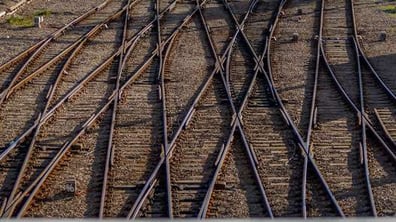How the Rail Industry Can Better Harness Data
The rail network is awash with data. It’s absolutely everywhere.
5 min read
 Konnor Baskaran
Oct 27, 2021 11:51:29 AM
Konnor Baskaran
Oct 27, 2021 11:51:29 AM

As more details emerge on how the Plan for Rail is going to impact the industry, we speak about Service Quality Regimes and how they will change rail.
“The rail industry in the UK is on the cusp of massive structural change that has been accelerated by COVID,” Toby began. Lockdown has permanently altered demand for the service and the Plan for Rail has emphasised the importance of change in order to preserve and grow UK rail.
“Service Quality Regimes (SQRs) are the new standard by which all Train Operating Companies (TOCs) will be judged. They are designed to measure the quality of the customer experience and cover every aspect of the service from station cleanliness to customer service.”
The Department for Transport will set KPIs (Key Performance Indicators) and clear targets to hit a certain percentage level of passes. This process is likely to be standardised at a national level, but there will be some variations to take into account the situation of individual TOCs. For example, Northern Rail already uses SQRs to measure customer experience. Also, some companies manage unique assets that will have to be added to their audit process.
“The intention is to bring in a standard set of expectations right across the railway, to support the aims of the Plan for Rail around simplification and passenger experience,” Toby explained. “Companies will be rewarded for meeting these targets. In a sense, this will turn them into concessions rather than franchise agreements. Providing the best customer experience will be the only opportunity for profit.
“This is radically different from the old model, which focused more on taking revenue from tickets and managing costs, while also having differing commitments within franchise agreements to adhere to.
“My advice for any TOC is to start preparing right now for the coming change, and educate yourself as much as possible on the details.”
SQRs are not an entirely new thing. In fact, many companies have started to use them internally, as Northern Rail has for several years. What is new is making SQRs one of the primary instruments for awarding profit. The old system fined TOCs for compliance failures, the new system rewards them for meeting targets.
“A common misunderstanding of the reform is that SQRs are a new type of regulation,” Toby continued. “Regulation comes in many forms and there is plenty of it, for good reason. But SQR is not a regulation, it is a measurement device for answering whether or not the customer is being served well." What the Williams-Shapps report identified correctly is that the demand for rail travel is changing in the short and long term.
“Even as COVID restrictions have largely been lifted, the virus has had a permanent impact on the rail industry: commuters are no longer going in five days a week. Now that fewer people use the service because they have to, the industry needs to move towards getting people on the train because they want to. Leisure travel will be more prevalent, and commuters have far more choice with flexible working patterns. The goal of the Plan for Rail is to make the train more affordable, accessible and simple to use.”
Many TOCs are going to have to overhaul their operating systems, because SQRs are ultimately how they are going to make their money. The rail network will effectively be in public ownership, but TOCs will still have shareholders and will need to turn a profit to maintain viability.
“It’s no longer about taking ticket revenue and controlling costs in relation to that,” .You can think of it almost as commission, because your allowable costs will be agreed, it’s simply about delivering the best customer experience possible.
“It is a massive task, but one fortunate element of this is that the process is heavily mandated and leaves little wiggle-room or ambiguity about how to implement it. You must hire an external auditor to do ‘secret shopper’ style inspections and you must have a technological solution to manage and gather data on your SQRs. It’s almost a ready-made tender, all you have to do is follow this framework."
“I would urge everyone in the industry, whether you are in a senior position or on the ground, to start to think about SQRs. The broad strokes of the system are public knowledge now – we know that they will be used to measure the cleanliness and ‘good repair’ of assets, the ease and comfort of travel, clear communication and customer services."
“Knowing this, you need to start asking questions: where are you currently on meeting SQRs? How realistic is it going to be to achieve targets? Do you have the right data and tools to measure this?"
“Even if it’s an internal process and you don’t have a digital solution in place yet, start to gather the right data. Check your asset register because you are going to have to account for everything, from carriages to vending machines outside the station. Without an up-to-date asset register compliance will be more challenging. Small details are going to count – an out-of-date poster can get you an immediate fail.”
Toby is quick to point out that the new regime is in some ways an extension of the old one.
“This isn’t about changing the aspiration: everyone in the industry comes into work to do a good job, to make the railway run well,” he said. “The problem historically has been a lack of tools and a different emphasis on operations, as well as a byzantine structure of discrete responsibilities and systems. The relatively short – in railway time anyway – lengths of franchise meant wholesale change was not practical.
“I’ve long talked about the problem of things falling between the cracks. I’m sure most staff have discovered the challenge of reporting a defect to the right person quickly. After numerous calls, emails or enquiries, the ‘right process’ could still not be clear and the staff member will have wasted their time. This experience for the well intentioned employee leads to an understandable ‘in the too hard basket’ attitude around stepping out of their direct responsibilities.
“Leadership is key, senior managers will need to understand and embrace this new way of thinking as will everyone in the industry. The whole team working together towards the same goal will be the new normal.”
The franchise model has resulted in an accumulation of disparate systems for data gathering and works. This complexity has built up in all parts of the industry and all the way through the supply chain to an extent that is difficult to comprehend.
“I spoke to a station manager recently about the daily struggle he has with IT solutions,” Toby recalled. “He told me he uses at least four different pieces of software daily and has to use many more, each with a specific function and no scope beyond that. You can see how it happens, over time TOCs have to find single point solutions to solve immediate problems, and these ‘solutions’ build up into a very inefficient patchwork of systems.
“Simplifying these tech stacks will be a by-product of the SQR. Data will need to be readily accessible, multi-dimensional and accurate. It should be possible for any employee to report a fault, and for that report to go to the right person who can then fix it. If you need data, it should be available at the press of a button.
“A lot of single point solutions are legacy systems that have been used for years and years. People can be averse to change but I believe the focus on SQRs will drive reform by demanding visible data.
“The closeness of the rail community means word will quickly spread and eyes will be opened to the benefits.
“It’s not even necessarily about shelving old solutions, but there does need to be software that joins all these systems up – the often talked about holy grail of ’the single source of the truth’.
“Change will happen but I’m sure it will be challenging, and no one will get it 100 per cent right all the time. But I am confident we will all appreciate this new singular focus in time.”
Visit our Rail Page for articles about how we are helping Train Operators prepare for rail reform.
The rail network is awash with data. It’s absolutely everywhere.
Where there are buses, there are risks. We’re talking about 12-tonne lumps of metal, after all. And no matter how well your bus company manages those...
There is still a perception that Smart Stations are a future technology with limited practical benefit. In this article Toby Hawkins, sales director...